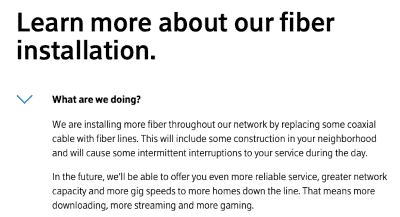 Some Comcast customers are receiving notifications their service may be briefly interrupted as a result of ongoing network enhancements:
Some Comcast customers are receiving notifications their service may be briefly interrupted as a result of ongoing network enhancements:
As you can imagine, customers are using our services more than usual, and in certain neighborhoods we are adding capacity to improve our network and your service now. Your area has been identified as a location that will benefit from network improvements, which is why it’s necessary for us to complete the work at this time, so you’ll continue to connect and enjoy the services you expect.
We are installing more fiber throughout our network by replacing some coaxial cable with fiber lines. This will include some construction in your neighborhood and will cause some intermittent interruptions to your service during the day.
In the future, we’ll be able to offer you even more reliable service, greater network capacity and more gig speeds to more homes down the line. This means more downloading, more streaming and more gaming.
 Comcast is currently preparing its network for full duplex DOCSIS 4.0 service by adopting “node plus zero” network architecture, which in plainer terms means removing signal amplifiers from existing lines and replacing a significant percentage of its copper coaxial cable infrastructure with fiber optics. The fiber network upgrades are reportedly bringing more consistent and faster internet speed on a more reliable network as soon as the switch is complete. Most customers won’t see fiber cables replacing the current cable line coming into their homes, however. The upgrade is mostly taking place on utility poles and, in some places, underground as Comcast replaces copper wiring with optical fiber cables.
Comcast is currently preparing its network for full duplex DOCSIS 4.0 service by adopting “node plus zero” network architecture, which in plainer terms means removing signal amplifiers from existing lines and replacing a significant percentage of its copper coaxial cable infrastructure with fiber optics. The fiber network upgrades are reportedly bringing more consistent and faster internet speed on a more reliable network as soon as the switch is complete. Most customers won’t see fiber cables replacing the current cable line coming into their homes, however. The upgrade is mostly taking place on utility poles and, in some places, underground as Comcast replaces copper wiring with optical fiber cables.
Sometime next year, Comcast is expected to start adopting Full Duplex DOCSIS (FDX) 4.0, the newest cable broadband standard, capable of bringing identical upload and download speeds to customers. It is the only major American cable operator to favor FDX, which will place upstream and downstream traffic on the same block of cable spectrum. Other cable operators including Charter Spectrum, Cox, and Mediacom will support Extended Spectrum DOCSIS (ESD) 4.0, which is expected to be cheaper to deploy and will continue to keep downstream and upstream traffic confined to separate frequency bands, albeit larger ones capable of delivering much faster speeds.


 Subscribe
Subscribe
In my NH town it’s crunch time for Comcast. Consolidated is, today, testing their gigabit fiber, which is cheaper, faster, and has no data cap. I guess Comcast is going to lose a lot of customers. Once I have changed I am unlikely to change back in a hurry. Comcast has been OK for me, but the slow upstream speed has always been a problem. Last time I checked Comcast said I was on a 600Mbps plan, and now they say 800 Mbps. I guess they are feeling the cold wing. I actually saw peak rates of 865Mbps, but the… Read more »